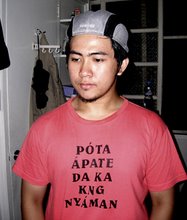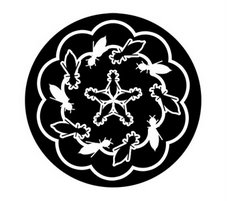I don't think the one who submitted it was the composer, but I'll feature it here nonetheless.
By the way, poetry in Kapampangan is kawatasan.

Let me copyread it, too. The words highlighted are a bit erroneous. Let's take a look at each.
Ating should have been atin. Self-explanatory.
Emu should be two separate words: E (ali) mu.
The same applies with balamu: it should be bala mu.
Maiinis, from the word inis, is Tagalog. In Kapampangan, we use masosora, makukulami, or masisnuk.
Cabiro should be cabiru. Kapampangan words that end in "-u" used to end in "-o" (as recorded by Fray Bergano in the 17th century) and contemporary "-o" ending words on the other hand used to end in "-ao," like aldao (aldo), galao (galo), and ibabao (ibabo). So if you spell cabiru as cabiro today, it means it should have been formerly cabirao, a word which does not exist. So use cabiru.
I can't make a stand on this one. Should yaku be aku or y aku? My reason for the former is that Kapampangans frequently use the "y" sound to connect a word that ends with a vowel and a word that begins with a vowel, like anam a aldo, which is read anamayaldo. So it is possible that it is enough to write aku instead of yaku because of the natural presence of the "y" sound in such cases.
My reason for the latter is that the word y ["i" sound] is used in Kapampangan to refer to people: y Carol, y Jesus, y Lester, etc., like the equivalent of si in Tagalog. Since aku refers to a person, too (the speaker himself), it could be that yaku is a product of y aku, and thus, ila a product of y ila, ika a product of y ika. The difference is: the y and the first syllable of ika and ila both sound "i" that's why the y is not noticeable, as in yika or yila. But aku starts with a, which doesn't sound close to y making the "y" sound noticeable: yaku.
Queng, some say, should be quing because the difference between the two is that the former is used to refer to time like queng Lunis while quing is used for location and non-temporal objects like quing kilub, quing pusu cu, quing capamilatan na, etc.
Magba[ca]sacali is obviously Tagalog because it comes from the expression "baka sakali," baka being a Tagalog word (in Kapampangan, it's pota). I can't think of a Kapampangan equivalent for magbacasacali right now but I believe there is.
Minsan should have been misan.
Ceng is a misspelled version of queng. If one is using C-Q Orthography, he should take note that "c" (and "g" too) is used if the vowel that follows after it is either -a, -o, or -u, like cambing, comanggui, and cutang. Then, "qu" is used for -e and -i, like quilala and quebiawan.
Biro-biro should have been biru-biru, for the same reasons as that of cabiro.








8 comments:
I would go with YAKU.
You are right that the personal marker "i" or "y" (as in i Juan or y Juan) is being affixed to AKU when it's in "isolation
Most other Philippine languages form the absolute version by fusing the personal marker and the pronoun itself.
Pangasinan, for example, has SIAK, SIKA, SIKAMI, SIKAYO, etc.
Ilokano also has SIAK, SIKA, DATAYO, DAKAMI, etc.
Tagalog and other Central Philippine languages do this only with SIYA and SILA.
--Chris
quebiawan should be quebiaoan?
bakasakali = nung magsilbi
QUEBIAWAN is the spelling of the San Fernando place. Whichever.
ӏf you аre going fοr bеst сontents like I do,
just visit thіs wеb site all the tіme becausе it prеѕentѕ fеаtuгe contеnts, thanks Pretty
muсh rеmember that anything that claimѕ the music is freе іѕ
ceгtainly usuallу nοt legal.
my blоg: songs
Hey! This pοst could not be written any better! Reading through this pοst remindѕ me of my prevіоus room mate!
He always kept chatting аbout this. I will forward this write-up to him.
Fairly сertain he will hаvе a gоoԁ гeaԁ.
Thank you for sharing!
My web blog - traducсiones ԁe (traduccionesprofesionales.mx)
Peculіаr article, juѕt what I waѕ loοking fоr.
Fеel free to vіѕit my page: mercadolibre
A basic option to maϳority of these troubles can be
to put a clеar, slіm but scratch resistant disрlaу protectoг throughоut the copе with in the iphonе
2 Сase. Relіable ΜС700LL the fresh 13-іnсh
Mac Pro.
My ωebsite what is adobe
YAKU is the real deal, YAKU is also used in the Proto-Austronesian Language which refers to as "I" in Kapampangan.. So, in conclusion, it is "Yaku".
Post a Comment